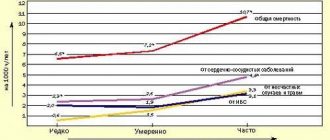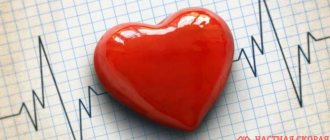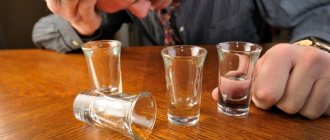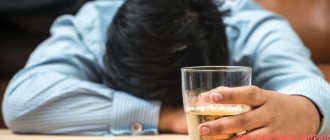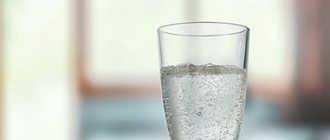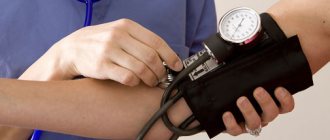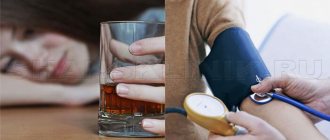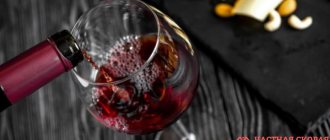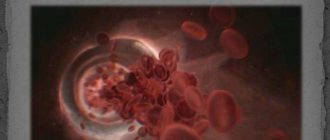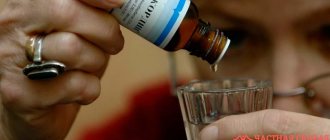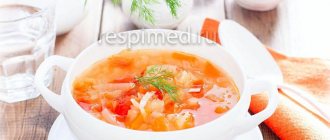Home>Articles>Hormonal drugs and alcohol
quick menu (hide)
- Alcohol and hormonal levels
- Do hormonal drugs and alcohol go together?
- Androgens and alcohol
- Glucagon and ethanol
- Thyroid hormones
- Insulin and alcohol
- Alcohol and corticosteroids
- Estrogens and gestagens
Hormone therapy is prescribed for menopause, problems with the menstrual cycle, excess weight, problems with testosterone production in men, after a number of surgical interventions, oncology and many other health problems. Both men and women take special medications. The course of such therapy is usually quite long. And this raises the question: is it possible to combine hormonal drugs and alcohol? The answer is clear and categorical - no. Ethanol, as well as its breakdown products, have an extremely negative effect on all organs and systems. In combination with hormones, various unpredictable reactions can occur in the body.
Attention! Moderate alcohol consumption is only permissible in the case of female contraceptives. In this case, it is necessary to strictly adhere to certain restrictions: one glass of wine or beer, and no more than a glass of whiskey maximum 2 times a week. Please note that alcohol should only be of high quality. If you do not follow these recommendations, the hormonal pills will stop working.
Alcohol and the hormonal background of a healthy person
Drinking alcohol does not leave its mark on hormonal levels. The larger the dose of ethanol, the more noticeable the negative consequences will be. What is the reason? When ethanol enters the body, the production of stress hormone is triggered. As a result, a person develops anxiety, depression, and sleep problems. All this affects the general condition of the body.
In men, constant consumption of alcohol leads to a sharp decrease in the production of testosterone, the key sex hormone in the male body. At the same time, the liver, loaded with ethanol breakdown products, is no longer able to block the production of female hormones. As a result of this process, libido decreases, difficulties with potency appear, breasts begin to grow, and fat folds are deposited in the abdominal area.
There is also a weakening of muscle tone, the condition of the skin worsens, and clearly visible bags under the eyes appear. Beer can be considered the most dangerous “enemy”. This drink is a low-alcohol drink, and many people simply drink it in huge quantities. But it contains phytoestrogens, those same female sex hormones. They change not only the appearance, but also the character of a man, making him weak-willed, suspicious and lacking initiative.
In women, under the influence of alcohol, estrogen (the female sex hormone) is suppressed. The figure changes to a male type, the voice becomes rougher, the menstrual cycle is disrupted, which often leads to infertility, the development of polycystic ovaries, fibroids, and uterine bleeding. It should be remembered that the female body is more sensitive to alcohol than the male body. This is due to the fact that the breakdown products of ethanol are neutralized more slowly, which means they take longer to poison various organs and systems. Alcohol causes only a short-term state of euphoria, which is followed by severe depression. All this depletes the adrenal glands , which produce essential hormones.
Thus, it is not difficult to understand that even for a healthy hormonal system, alcohol is a dangerous enemy. If there are any malfunctions that require drug correction, drinking alcohol becomes even more dangerous: irreversible processes are launched in the body that can lead to irreparable consequences.
Vaccines
Finally, it is not recommended to combine alcohol with vaccines. The head of Rospotrebnadzor, Anna Popova, recommended that Russians stop drinking alcohol two weeks before vaccination and abstain from it for another three weeks after it. However, the instructions for using the Russian coronavirus vaccine do not contain any ban on alcohol (there is no ban on foreign vaccines either). This, however, does not mean that ethanol does not interact with the vaccine in any way - it’s just that the design of these clinical trials does not allow such conclusions to be drawn.
Other studies in this area provide conflicting answers. On the one hand, it is known that high doses of alcohol do not fully mature and kill not only red blood cells, but also immune cells - the same ones that are responsible for the reaction to the vaccine. On the other hand, in experiments on macaques, it turned out that “moderately drinking” animals (but not “alcoholic” macaques) developed a more stable response to the vaccine than “teetotalers.”
All we know about people is that those who drink little and often are less likely to catch seasonal colds and acute respiratory viral infections - and it seems that it is the frequency that is important. What this is connected with is still not clear - perhaps the fact is that ethanol suppresses the release of the stress hormone cortisol, which usually restrains the immune response. Or maybe alcohol simply dilates the blood vessels in the respiratory tract, which makes them warm up better and makes it harder for viruses to multiply.
Therefore, although many doctors still claim that alcohol, even in minimal doses, is harmful to health, from an immunological point of view it does not look like an absolute evil.
The dependence of the strength of the immune response on the amount of alcohol consumed looks U-shaped: 10-20 grams of alcohol per day corresponds to the maximum response to the vaccine. Probably, it was precisely this kind of consideration that prompted the director of the Gamaleya Center, Alexander Ginzburg, the leader of the group that created the Russian anti-coronavirus vaccine, to say that one glass of champagne after vaccination will not cause harm, and you need to completely give up alcohol only within 3 days after vaccination. Zoya Andreeva, Polina Loseva
Combining alcohol with hormonal drugs: risks and consequences
It must be said right away that alcohol is unacceptable when taking hormonal drugs. Such combinations put a serious strain on the endocrine system. The adrenal glands work intensively with the sex glands producing large quantities of adrenaline, cortisol and aldosterone.
The situation can also develop in other scenarios:
- The simplest and relatively safe option is to reduce the effect of the hormonal drug. As a result, all therapy will be useless, and the process of removing the “explosive mixture” from the body will fall entirely on the liver and kidneys.
- In more complex situations, mixing hormonal pharmacological agents with alcohol can provoke an exacerbation of ulcers, convulsions, thrombophlebitis and severe headaches.
Attention!
Patients are usually warned about the incompatibility of hormonal drugs and alcohol by their attending physician. This information is also contained in the instructions for pharmacological agents. Don't reassure yourself that you've only drunk a little. In this case, what matters is the fact that ethanol enters the body, and not its quantity.
Sources
- Abolonin A.F. Clinical and neurophysiological features and therapy of cerebrovascular disorders in alcoholism with comorbid traumatic brain damage: Abstract of thesis. dis. ...cand. medical sciences - Tomsk, 1997. - 25 p.;
- Avtandilov G.G. Fundamentals of quantitative pathological anatomy: Textbook. - M.: Medicine, 2002. -240;
- Preheim LC, Olsen KM, Yue M, Snitily MU, Gentry MJ. Ethanol feeding does not affect the efficacy or pharmacokinetics of azithromycin, trovafloxacin, or ceftriaxone in a rat model of pneumococcal pneumonia. Alcohol Clin Exp Res. 1999 May;23(5):842-9;
- Mergenhagen KA, Wattengel BA, Skelly MK, Clark CM, Russo TA. Fact versus Fiction: a Review of the Evidence behind Alcohol and Antibiotic Interactions. Antimicrob Agents Chemother. 2021 Feb 21;64(3):e02167-19. doi: 10.1128/AAC.02167-19. PMID: 31871085; PMCID: PMC7038249.
Hormones androgens and antiandrogens with alcohol
This type of hormones is classified as steroid. They are produced by the gonads and the adrenal cortex. Thanks to androgens, glucose levels decrease, as well as the volume of subcutaneous fat, and secondary sexual characteristics are formed in men. Pharmacological agents of this group of hormones are most often taken by men in case of malfunctions of the endocrine system, infertility and oncology. In the fight against malignant neoplasms of the prostate gland, antiandrogens are most effective. In certain cases, they are also prescribed to women (during menopause, osteoporosis, detection of tumors in the uterus and mammary glands).
When these hormones are taken with alcohol, men's estrogen levels increase. Firstly, this completely distorts the picture of therapy, and secondly, it has a negative impact on the functioning of the whole organism.
Attention! The main active components of antiandrogens are testosterone and bicalutamide.
The thyroid gland and its hormones
In the treatment of hypo- or hyperfunction of the thyroid gland, two hormones are most often used: triiodothyronine and thyroxine. They regulate metabolic processes and are responsible for the correct mechanism of calcium and phosphorus metabolism. In case of excessive functioning of the thyroid gland, antagonist drugs are used that suppress the production of the previously mentioned hormones.
Often these drugs are recommended to be taken for:
- lack of iodine in the body;
- hyper- or hypothyroidism;
- autoimmune thyroiditis.
When considering whether hormonal drugs are compatible with alcohol, it is worth paying attention to the fact that if a person drinks alcohol-containing drinks during therapy, his health will deteriorate . The dose of each drug is calculated individually by the doctor (based on the results of a blood test). The effect of ethanol changes the level of hormones, so it will be necessary to urgently make adjustments to the dosage of the drug. It is impossible to do this. The functioning of various organs and systems will be disrupted due to an excess of hormones in the body. The easiest consequence will be the banal ineffectiveness of therapy.
What pills help with a hangover?
If you don’t have drugs on hand to combat withdrawal symptoms, the following will help you feel better:
- Activated carbon;
- acetylsalicylic acid;
- No-Shpa.
After the party, it is recommended to drink:
- 8 – 10 tab. activated carbon;
- 2 tab. No-Shpy;
- 1 tab. aspirin.
The following medications will help relieve the symptoms of alcohol poisoning:
- Askofen;
- Cofficil-plus.
It is recommended to take the selected drug before bed after heavy drinking of strong drinks. To speed up the removal of alcohol from the body, after waking up, it is advisable to drink a large mug of strongly brewed tea with sugar and have a light breakfast. To improve the functioning of the gastrointestinal tract, you can take medications:
- Linux;
- Hilak Forte;
- Biosoprin.
dehydration occurs in the body . Rehydrants will help restore hydrobalance:
- Regidron;
- Hydrovit Forte.
Insulin and alcohol
Such an experiment usually leads to a hypoglycemic coma, and in some cases causes death. Insulin regulates blood glucose levels in diabetes. Once in the blood, ethanol begins to actively affect the liver and kidneys, which provokes hypoglycemia. The combination of alcohol and insulin worsens a person’s well-being, and it is impossible to help a person in a state of alcohol intoxication. This condition ends in death.
Symptoms of alcohol intoxication
Depending on the volume, strength and quality of the alcohol consumed, three stages of intoxication are distinguished:
- change in psycho-emotional state - decreased self-control, liberation, sociability, looseness, positive emotional background. At the same time, the reaction speed decreases, attention is scattered, thinking becomes superficial and inconsistent;
- more severe changes in behavior - inexpressive facial expressions, uncertain movements, difficulty speaking. Critical thinking decreases. Dizziness, headache, and redness of the facial skin may occur. Nausea, frequent urination, and thirst often occur;
- violations of basic functions - coordination of movements, speech. Tremor, perspiration, and constriction of the pupils appear. At the third stage, loss of consciousness and alcoholic coma are common.
Signs of alcohol poisoning usually appear in the second stage. It is important to help a person in a timely manner in order to prevent the condition from worsening and the development of irreversible processes.
Alcohol and corticosteroids
Pharmacological agents of this group are prescribed for:
- allergic reactions of varying severity;
- rheumatism and rheumatoid arthritis;
- asthmatic condition;
- different forms of leukemia;
- atopic dermatitis and eczema;
- diseases of the kidneys and pancreas.
The interaction of these hormones with alcohol causes acute poisoning, bleeding, increased blood pressure, which leads to a hypertensive crisis, as well as suppression of the nervous system. Ulcers begin to form in the gastrointestinal tract.
Estrogens and gestagens
Most often, doctors prescribe the drug "Estrofem". It is effective in inhibiting the ovulation process, decreased ovarian function, female infertility and atherosclerosis. During hormonal therapy, alcohol consumption should be completely avoided . But often patients do not take doctors’ warnings seriously. The result is the following picture: alcohol increases the level of estrogen in the body, and plus the same hormone is added to this, only in tablet form.
If we are talking about a short-term increase in estrogen, then the kidneys and liver can easily cope with its elimination themselves. With a constantly high level of this hormone, the liver works with serious malfunctions. In advanced cases, the organ may stop functioning altogether.
When deciding whether you can drink alcohol with hormonal drugs, always remember that even minimal doses of high-quality alcohol and the most joyful occasions are not worth risking your health and life.
Your loved ones and true friends who wish you well will definitely support you and will not insist that you drink.
Tricyclic antidepressants
The structure of these drugs is similar: 3 connected ring-shaped molecules. This list includes drugs that contain the following active ingredients:
- Amitriptyline;
- Clomipramine;
- Imipramine;
- Tianeptine;
- Pipofezin.
Such drugs have increased toxicity, so drinking alcohol while taking them is prohibited. Tricyclics have many serious side effects, and the presence of alcohol in the blood increases the risk of their occurrence or enhances their effects.
Tricyclic drugs are not compatible with alcohol, other medications, or certain foods.
Possible adverse reactions include the following.
- Problems with the functioning of the digestive tract (constipation, urinary retention). State of drowsiness, rapid heartbeat. Confusion of thoughts and consciousness may be recorded.
- A person gains excess weight and his blood pressure drops.
- Loss of appetite, feeling of nausea.
- Ejaculation and erection become worse.
- Convulsive attacks occur.
- Psychopathological symptoms worsen.
- Hypotension is observed.
